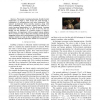71 search results - page 6 / 15 » Intrinsically Motivated Reinforcement Learning |
ICRA
2008
IEEE
14 years 2 months ago
2008
IEEE
— We present a learning mechanism, Socially Guided Exploration, in which a robot learns new tasks through a combination of self-exploration and social interaction. The system’s...
ATAL
2007
Springer
14 years 2 months ago
2007
Springer
Reinforcement learning is a popular and successful framework for many agent-related problems because only limited environmental feedback is necessary for learning. While many algo...
GECCO
2011
Springer
12 years 11 months ago
2011
Springer
The reward functions that drive reinforcement learning systems are generally derived directly from the descriptions of the problems that the systems are being used to solve. In so...
JMLR
2002
13 years 7 months ago
2002
Lyapunov design methods are used widely in control engineering to design controllers that achieve qualitative objectives, such as stabilizing a system or maintaining a system'...
ICML
2003
IEEE
14 years 1 months ago
2003
IEEE
Shaping can be an effective method for improving the learning rate in reinforcement systems. Previously, shaping has been heuristically motivated and implemented. We provide a for...

